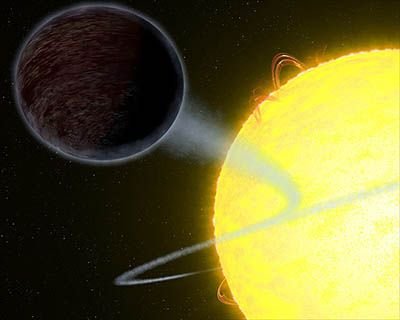There are things that surpass the human imagination due to their eerie nature, especially when thinking about events, and certain characteristics some planets in space are capable of exhibiting. There are some plants in space that have strange characteristics that can only happen in a human’s wildest imagination. Characteristics so strange they will make you cringe.
This post is intended to highlight some of the unusual characteristics of some of the Planets in Space, with the basic understanding of how our planet functions. These characteristics range from the temperature to the general nature of the planet.
Rainfall which is an important part of the water cycle on planet Earth, as we have all come to know. When you pay a visit to Planet COROT-7b and compare the nature of rainfall on both planets, it is a different ball game entirely. You will be shocked to find out what substance falls down whenever it rains.
COROT-7b
About The Planet
.jpg)
Artist's impression of Corot-7b(alternative) by ESO/L. Calcada under Creative Commons Attribution 4.0 International license.
This Exoplanet was previously called COROT-Exo-7b, it orbits around the Star [COROT-7] in the Constellation Monoceros. Due to the close proximity of COROT-7b to its host star, the surface of the planet is covered in molten lava. Situated 489 light years from planet Earth, it is the first rocky planet discovered away from the Milky Way solar system by the use of the Transit Method of Detection.
Discovered in 2009, the possible gas giant planet has been estimated to have the same size of planet Neptune. The planet is known for its extreme temperatures, surface temperatures are around 2500C (4500F). There are possibilities that the planet had once been a giant gas, then it got too close to its host star, which resulted in the evaporation of its atmosphere that left the planet with its rocky core. Gas giant Exoplanets who lose their atmosphere in such fashion are referred to as Chthonian planets, but Corot-7b is still known as a Super Earth.
Due to the close proximity to its host Star, it only takes Corot-7b 20.5 hours to one complete orbit; covering a distance of 1.6 million miles (2.6 million kilometre). With an estimated mass of around 5 to 8 times that of planet Earth and a radius of 1.58 times that of Earth, it can be concluded that Corot-7b is one of the smallest exoplanets ever discovered
Strange Nature
Due to the high temperatures on the planet, more than enough to make the rocks melt, and then evaporate like puddles of water, here on Earth. The other part of the planet which is relatively cool at about 3500F (190C), so the rocks evaporate and then condense into huge stone clouds, under the hellish temperature on the hot half of the planet.
And then, these clouds fall as rains of magma, heading back to the surface. On the cooler side of the planet, the rain made of magma solidifies into stones before hitting the surface as stones.
This is a real rain of stones, can you imagine what it will be like there?
55 Cancri e
About the Planet

Artist's impression of 55 Cancri e by ESA/Hubble, M. Kornmesser under the Creative Commons Attribution 4.0 Unported license
The Exoplanet 55 Cancri e (Abbr as 55 Cnc e), also known as Janssen has several amazing features, one of the more notable is that it takes less than 18 hours to orbit its Sun-like host star 55 Cancri A. For those that don’t know the implication of that, it simply means that it takes less than 18 hours to reach a year on the planet - amazing!
55 Cnc e is 40 light years away from planet Earth, its mass is 8.63 times the mass of Earth, and a diameter roughly twice that of our little blue planet. Hence, 55 Cnc being classified as a super-Earth. The side of 55 Cnc e facing its host star has an approximate temperature of 1700C or 3100F, this is hot enough to melt Iron.
Hydrogen and Helium have been recently detected on the planet, and this was detected by NASA’s Hubble Space Telescope. It is speculated that Hydrogen cyanide, could possibly be found on 55 Cancri e. No trace of water vapour has been traced in its atmosphere, only the presence of a global lava ocean
Strange Nature
It is speculated that the planet could be rich in carbon materials as its building blocks, other than the usual abundant oxygen material which the majority of terrestrial planets in the milky way galaxy (which is the solar system we live in) are made of. This implies that one-third of the planet’s mass would mostly be carbon, which may appear in form of diamonds
WASP-12b

The Pitch-Black Exoplanet WASP-12b by NASA, ESA, and G. Bacon (STCcl) under the Creative Commons Attribution 4.0 Unported license
About the Planet
Its discovery was made known to the world on April fool’s day (April 1, 2008), this amazing exoplanet has a low density, in fact, one of the lowest densities for an exoplanet; and this is as a result of its close proximity to its parent star WASP-12 which inflates the exoplanet with the flux of its energy. In contrast to Earth’s 365 days in the completion of a full orbit, it only takes WASP-12b a little over a day to orbit its host star.
Due to the planet’s close proximity to its parent planet WASP-12, it is recorded that the star’s tidal forces are twisting it into an egg shape, and dragging away its atmosphere at a fast rate (189 quadrillion tonnes) yearly. This process is referred to as tidal heating, and when combined with the planet’s close proximity to its host star, results in bring the planet’s surface temperature to a staggering 2,200C
With an approximate distance of 2,115,000 miles between WASP-12b and its parent star.Water has been detected in the atmosphere of this extrasolar planet, although things don’t look so good for the planet. NASA recently reports that the parent star to WASP-12b is currently consuming the planet, making it a historical event as the first time this phenomenon will be clearly observed. The planet has about 10 million years of life before being fully consumed, as estimated by NASA.
Strange Nature
Due to the high surface temperatures on this planet, which is an average of 2250 degrees Celsius; making this hell of a planet hottest ever exoplanet ever discovered. Which orbits its parent star WASP-12 in just over a day.
TrES-2b

TrES-2b by David A. Aguilar (CfA) with Creative Commons Attribution-Share Alike 3.0 Unported license
It may interest you know that there is a matte black planet, TrES-2b (Aka Kepler-1b) is a planet that exists outside our solar system, making it an exoplanet or an extrasolar planet. Situated 750 light-years from our galaxy. The radius and mass of the planet suggest it to be a gas giant, having a similar composition with planet Jupiter. Closely situated to its parent star, it has been categorized among a set of planets known as the hot Jupiters.
Little details are known about TrES-2b, that was discovered on August 21, 2006, a relatively new planet.
Strange Nature
The planet orbits at a distance of 3 million miles from its parent star, yet, it reflects no light. It is regarded as the darkest planet ever found. It is known to reflect less than 1% of the light that hits it from its host planet
References
Solar System Quick | Corot-7b
Wikipedia | 55 Cancri e
Wikipedia | WASP-12b
Wikipedia | TrES-2b
Express | 10 weirdest planets


Being A SteemStem Member
You received a 60.0% upvote since you are a member of geopolis and wrote in the category of "geology".
To read more about us and what we do, click here.
https://steemit.com/geopolis/@geopolis/geopolis-the-community-for-global-sciences-update-4
The Trappist 1 system ist also worth a look. There are seven planets similar to earth. Wondering if there might be life on more than one planet in one solar system. If there is life similar to humanity they could inhabit multiple planets in one solar system. Imagine how it would be if Mars would be habitable
That's amazing...You've inspired my next post!
Thank you so much, I'll notify once am done writing it.
nice! Looking forward to it
very nice
👍
the planets are really unbelievable...thanks to you, I think I got the planets figured out...you nailed it
Thank you
Incredible, I heard about one that rains diamonds, do you know it ?
Well, during my research I didn't come across such planet. The only planet that comes close to the one you are suggesting is 55 Cancri e which I mentioned in this post. And it doesn't rain diamonds, on 55 Cancri e, it is only speculated that 1/3 of the planet could be made of diamonds due to its atmospheric conditions.
Oh, I see